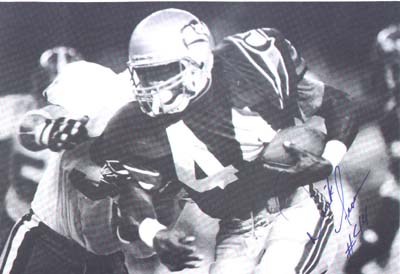
  |
|
Eric Unverzagt | Tyree Davis | Derrick Fenner | Brian Flones | Ken McAlister | Warrick Dunn | Home Derrick Fenner
Ah, number 44. At the time of this writing, Derrick Fenner is tied in second place for the greatest number of TDs in a Seahawk season. Shaun Alexander (2001) and Chris Warren (1995) lead the team with 16; followed by David Sims (1978), Sherman Smith (1979) and Derrick Fenner (1990) with 15. Pretty impressive, but not as impressive as this. Derrick Fenner wore #44 in Seattle as a reminder of the 44 days he spent in jail for a crime he didn't commit. His arrest was a case of mistaken identity. I've admired Fenner for his athletic ability on the field, and I admire him too for trying to rise above mistakes of his past that weren't very serious and none too pleasant. He got mixed up in the wrong crowd. He did bad things. But he didn't commit the murder for which he was arrested. Fenner's story is enough to ruin anyone, particularly one who has ambitions of playing in the NFL. Yet he made it to the National Football League, to the Seattle Seahawks, and wore the #44 jersey to remind him of the 44 days he spent in jail...a visible reminder of a past he wanted to leave behind. Did he succeed? I'm not sure. I don't know what happened to Derrick Fenner. But I hope he made it, and I thank him for the memories of seeing yet another Seahawk touchdown!
Fenner Deep in Work Ethis with 2nd Chance in Seattle
KIRKLAND, WASH. -- Derrick Fenner is one of the first three players on the practice field and the last player to run off -- not just yesterday, but many days since the Seattle Seahawks camp opened two weeks ago. Just when the position coach feels his work is done, Fenner has more questions about pass routes or blocking assignments. The Seahawks' trainer tried to find a workout regimen that would exhaust Fenner and finally gave up Once Fenner was the last man on the practice field and the first off, feeling the team was lucky he bothered to show at all. Funny how attractive the practice field can become after a guy spends a few nights in jail on a murder charge, gets shot in the chest outside a nightclub and is later put on probation for drug possession. "Only a fool wouldn't appreciate a second chance like this," Fenner said. "I can't even afford to look at this as a second chance. Really, it's a last chance." So, here is the 22-year-old Fenner, on the other side of the continent from his home and family in Oxon Hill, Md., trying to prove the Seahawks' faith in him is justified and that he is ready to put that 6-foot-4, 228-pound body to work. The rust is coming off, bit by bit. Fenner hasn't played competitive football since 1986, after academic troubles, then the mistaken indictment in Prince George's County for murder (someone else has since been convicted of the crime) led to his leaving a promising if undisciplined career at the University of North Carolina. Fenner nervously awaits Friday night, when Seattle's preseason game against the Cardinals in Phoenix will afford him the chance to carry a football for the first time in more than two years. "I'll be nervous," he said Tuesday after practice. "I've got to use some of that nervous energy to exact some force on the field." Mike Allman, Seattle's director of player personnel and the man who pushed for the Seahawks to draft Fenner in the 10th round, said Fenner was shocked when he was timed in 4.7-plus for the 40-yard dash after the draft. "When he first came in, I didn't see the foot quickness," Allman said. "But it's since come back with work." 3,000 Miles From Trouble. Indeed, the coaches are smiling and the other backs in camp here have reason to worry. Fenner shed seven pounds to reach 228, then got his time in the 40 down to 4.63. "Two weeks ago, I got it back to 4.5," Fenner said. "I want it down to 4.4-something real soon." There are teams in the league with more need of Fenner's talents. After all, Seattle's starting backfield is pretty much set, with Curt Warner at tailback and John L. Williams at fullback. But in an important way, Seattle is the perfect place for Fenner; it's nearly 3,000 miles from home, and the troubles that nearly ruined his life. "This is a beautiful place, a very pretty city," Fenner said of his new home. "It's the other side of the country and I know it's good for me to get out here. It's a good place to start a new chapter. It's quiet, settled. I still love D.C. and it's my home. I call my mom and talk with her. I hear about all the troubles going on there. It seems things have just gotten out of hand back home and something has to be done. But I'm thankful to get another chance out here." Fenner said he knew he needed to figure out why he tended to show up late for meetings and practice and skip classes at North Carolina. "I was just a spoiled kid coming out of high school," he said. "I got to college and figured I was a star, and pretty much in control of the situation. I figured, 'I'm the star. If they want to win they've got to play me, right? I'll just show up {for practice} when I want to.' "The only word you can use to describe that is 'immature' " Fenner said. More than 40 days in jail, before the murder charge was dropped, gave Fenner a lot of time to be frightened and think. When he enrolled at Gardner-Webb College, an NAIA Baptist school in North Carolina last August, he discovered he was capable of self-discipline. "I knew I had to walk the straight-and-narrow," he said. "I was consistently on time for meetings and classes. I saw signs within myself that I could be just as disciplined as anybody else." University of Michigan Coach Bo Schembechler felt Fenner was making an honest effort, and allowed him to use the facilities in Ann Arbor to work out in the months preceding the draft and get himself in playing shape. That was something Fenner needed, because he had not been allowed to play at Gardner-Webb. "That really was the start," Fenner said of his Michigan efforts. "I worked out six days a week, four hours a day, and we talked. They were good talks. Bo Schembechler told me not to let what happened stop me. I had always believed I could make it in the NFL and I really think it was in Ann Arbor that I started to turn it around." The NFL teams obviously weren't so certain. While the league office did its snooping into Fenner's predicament, Allman was conducting his own investigation of sorts. Allman, who worked for the Redskins for nearly 20 years, had followed Fenner's career. "My brother is a D.C. cop," Allman said, "and I checked my sources in the area. The big thing is that his probation did not restrict him to the D.C. area, and if he was straight with the court system, maybe he deserved another chance." When the draft rolled around, Fenner was hoping to be taken in the eighth round. But his name was still there when Seattle's turn came up in the 10th, and Allman said, "Look, this guy is the best talent on the board. He was probably the best talent on the board going into the fifth round." Tom Flores, the Seahawks' new president and general manager, trusted Allman had done his homework and approved the move to draft Fenner. The reaction in Seattle, which had problems enough dealing with Brian Bosworth's hairstyle, was predictable. "These types of things don't sit well here," Allman said. "I explained all that to Derrick, that he would be scrutinized more than the Boz or anybody else who'd ever been here. "I told him, 'Derrick, if we run you out of here it won't be because you can't play. It'll be because you screwed up off the field after the sun went down. You're good enough to play in this league. You're not going to get cut because you're not good enough. Now, forget about all this stuff in the past and get on with your life.' " Allman added, "I check behind him once in a while, and he's been a model citizen." 'The Talent Is There' That, of course, is a prerequisite. But Fenner better be able to bust through a hole or two if he is to beat out second-year back Kevin Harmon and third-round draft pick Elroy Harris to become the No. 2 man on the depth chart at tailback behind Warner. "Derrick's got to learn fast," Harris said. "You can see the talent is there. Now, however, he won't just be running the sprint-draw out of the I-formation like he was at North Carolina. He has to learn the audible system, multiple formations, how to deal with cagey veterans, picking up blitzing linebackers which as an I-back he never had to do." Blocking is something Fenner wasn't asked to do in his short stint as a Tar Heel. But in the midst of a series of particularly sharp practices, Allman says, "If he can run and catch, we can live with his blocking." On this particular afternoon, Fenner walked off the practice field and told a visitor that he keeps saying to himself, " 'Make the team, make the team, make the team.' You know, I think the toughest thing for me to get used to again will be the contact. You can run routes and catch passes all you want, but the fact is I still haven't been tackled in a game in more than two years. "But I feel it coming back, I really do. Making money and making up for lost time . . . that stuff will take care of itself. What I've got to do right now is make the most of this team and make the most of this chance.
Six weeks in jail, being charged with a murder you didn't commit, will give you time to think, time to learn, time -- as Derrick Fenner said yesterday -- to "plan on becoming a different person." However, only more time, lots more time, will tell whether the mistaken indictment really will wise up and set straight one of the most promising football players in America. Yesterday, as Fenner spoke for the first time about his six-month ordeal and his future hopes, the former Oxon Hill High School and University of North Carolina star seemed contrite, reformed and determined both to restore his good name and resume his athletic career. "What I'd really like to do is go back to North Carolina and finish what I started," he said. "Prove myself -- to my family and the public -- and show people I'm not a murderer, not that type of person." If only wishing would make it so. Not even Fenner really knows how this story is going to end. On one hand, he said "the worst is behind me. . . . I'm thankful and overwhelmed . . . Anytime there is a chance of a conviction, of spending the rest of your life in jail, even if you're innocent, it's horrible. It's impossible to explain {the feeling}." On the other hand, Fenner still faces trial Jan. 25 on drug and gun possession charges. Police said they found 25 vials with cocaine residue in Fenner's coat, plus a .38 pistol under the driver's seat when they stopped him as he drove a truck that belonged to a friend. The good news is that police and prosecutors are now convinced that Fenner was nowhere close to the scene of a drug-related shooting spree in the Kirkwood projects in May that left one man dead. When prosecutors drop charges after they already have an indictment in hand, that's even more formidable evidence of innocence than a not-guilty verdict. It means they're certain they got the wrong man and don't want to put him through the agony of a trial. The bad news is that for several months before his arrest in June, Fenner had been hanging out with the kind of people you usually see only in a Charles Bronson flim. Two of his friends soon will stand trial for two murders, including charges of the premeditated killing of a potential prosecution witness. "I learned a great deal. Drugs and athletics, the street and drugs, drugs, period, is not the way to go -- doing or selling," said Fenner, who later added, "How do you find a friend? It's really hard choosing." At least Fenner had a better fate than the University of Maryland's Len Bias, a comparably talented basketball player, whose friends helped lead him to death by cocaine overdose. "I didn't connect it then. I was blind then," said Fenner. "Now, I really see the comparison. Old friends with less talent trying to bring you down. . . . You have to step back and look at your so-called friends and evaluate." Much in recent years has redounded to Fenner's discredit. His North Carolina career was marked by breaches of rules and run-ins with then-coach Dick Crum. After leading the Atlantic Coast Conference in rushing (and being fifth in the nation) as a spectacular but frequently disciplined sophomore, Fenner flunked out. Left behind were memories of his bragging and girlfriends, his candy-red BMW with car phone and his flashy taste in clothes. At 6 feet 4 and 225 pounds, with 4.5 speed, he looked like a pro among kids. He'd rush for 328 yards one day against Virginia and look like the next Eric Dickerson, then miss a bus or practice the next. "It's on me, flunking out of school," said Fenner, an admission many coddled star athletes never make. "The tutors were there. I'd say, 'Later. I'm going out tonight.' I felt that I could ease by. . . . Becoming a {public} figure, I was caught up in that. It was one of my problems. . . . Sometimes it's even harder for a star student athlete." Don't get the idea that Derrick Fenner is now Harry Humble. He's still full of himself. He showed up for his news conference in flashy duds, a geometric pattern of black and white leather and velour, with a sequence of red arrows encircling the waist. He still thinks he'll beat the misdemeanor charges against him and then the colleges will be lined up to ask him to come win a Heisman Trophy for them. His casual asides make it clear he hasn't a doubt in his mind that he could start for the Washington Redskins on Sunday. And maybe he could. His lawyer says a suit to make the NFL let Fenner turn pro before his college class graduates is an option. "I can picture myself doing many things in pro ball," said Fenner. "With the dismissal of this murder charge, there will be many schools and conceivably some {NFL} teams willing to take a chance on someone with Derrick's integrity and talent," said Fenner's lawyer Fred Joseph. "This is not a street bum we're dealing with." No. But he's no man of integrity yet, either. Fenner has an enormous amount to prove. Almost all of it outside a football field. In the last six months, Fenner has lived out a universal nightmare. The police knock on your door, ask where you were the night of so-and-so, you get your story a little tangled and before you know it, you're in jail for weeks, indicted for murder and see your face on the front page. Then, it turns out it really was somebody else. For this, Fenner deserves some sympathy. But, all the circumstances considered, not too much. He also deserves another chance -- in society and in football. But, to be blunt -- so a man-child long pampered understands the real score -- maybe only one more
|


